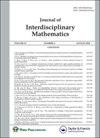Dynamics and control of a mathematical delayed Cholera model
IF 0.8
Q1 MATHEMATICS
引用次数: 0
Abstract
A delay differential equation-cholera model with infection from aquatic reservoir and environmental disinfection as intervention is constructed and analyzed in human population. It is assumed that the time lag is the period between oral intake of contaminated water or food to full cholera infection in the population. Basic properties of the model that ascertain its mathematical and epidemiological well-posedness are determined. A unique disease-free and cholera endemic equilibria are found and the control reproduction number is computed. Global and local attractiveness for disease-free and endemic equilibria are proved to depend on the control reproduction number and time delay as threshold quantities. The impacts of time delay on stability of equilibria and endemicity are studied, furthermore conditions for Hopf bifurcation are computed. Disinfection of environment is shown to increase the number of healthy individuals and lower the concentration of cholera in the environment. Numerical simulations are used to support theoretical results.数学延迟霍乱模型的动力学与控制
建立了一种以水生水库感染和环境消毒为干预的延时微分方程-霍乱模型,并对其进行了分析。假定时间滞后是指从口服受污染的水或食物到人群中完全感染霍乱之间的时间。确定了模型的基本性质,确定了模型的数学和流行病学适定性。发现了一种独特的无病和霍乱地方性平衡,并计算了控制繁殖数。证明了无病平衡点和地方性平衡点的全局和局部吸引力依赖于控制繁殖数和时滞作为阈值。研究了时滞对平衡点稳定性和局部稳定性的影响,并计算了Hopf分岔的条件。环境消毒可以增加健康个体的数量,降低环境中的霍乱浓度。数值模拟支持理论结果。
本文章由计算机程序翻译,如有差异,请以英文原文为准。
求助全文
约1分钟内获得全文
求助全文
来源期刊

JOURNAL OF INTERDISCIPLINARY MATHEMATICS
MATHEMATICS-
CiteScore
2.70
自引率
23.50%
发文量
141
期刊介绍:
The Journal of Interdisciplinary Mathematics (JIM) is a world leading journal publishing high quality, rigorously peer-reviewed original research in mathematical applications to different disciplines, and to the methodological and theoretical role of mathematics in underpinning all scientific disciplines. The scope is intentionally broad, but papers must make a novel contribution to the fields covered in order to be considered for publication. Topics include, but are not limited, to the following: • Interface of Mathematics with other Disciplines • Theoretical Role of Mathematics • Methodological Role of Mathematics • Interface of Statistics with other Disciplines • Cognitive Sciences • Applications of Mathematics • Industrial Mathematics • Dynamical Systems • Mathematical Biology • Fuzzy Mathematics The journal considers original research articles, survey articles, and book reviews for publication. Responses to articles and correspondence will also be considered at the Editor-in-Chief’s discretion. Special issue proposals in cutting-edge and timely areas of research in interdisciplinary mathematical research are encouraged – please contact the Editor-in-Chief in the first instance.
 求助内容:
求助内容: 应助结果提醒方式:
应助结果提醒方式:


